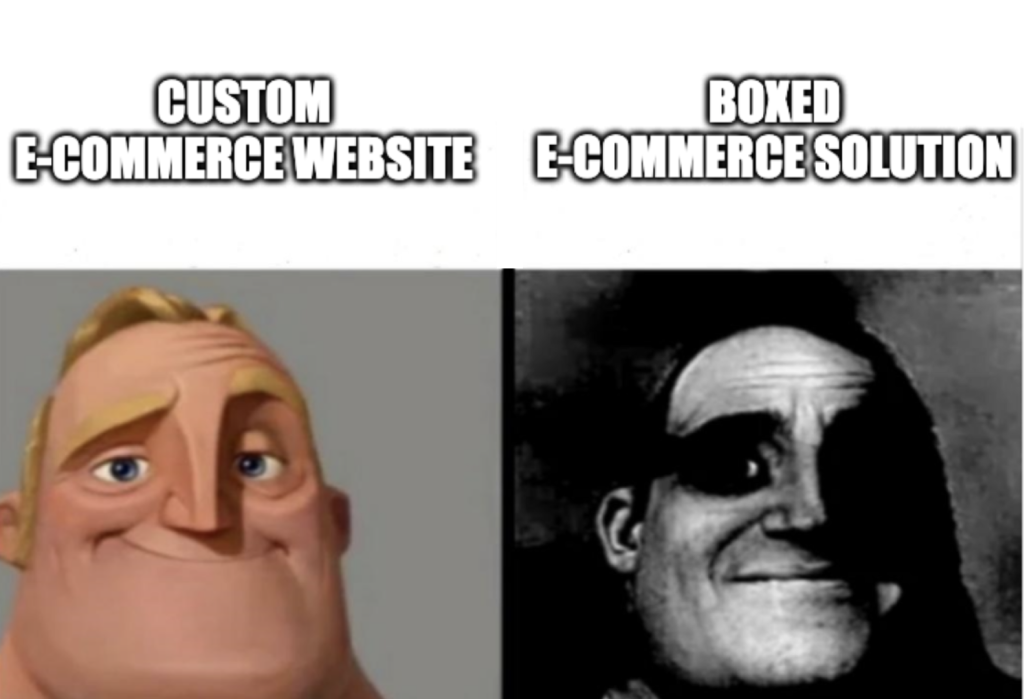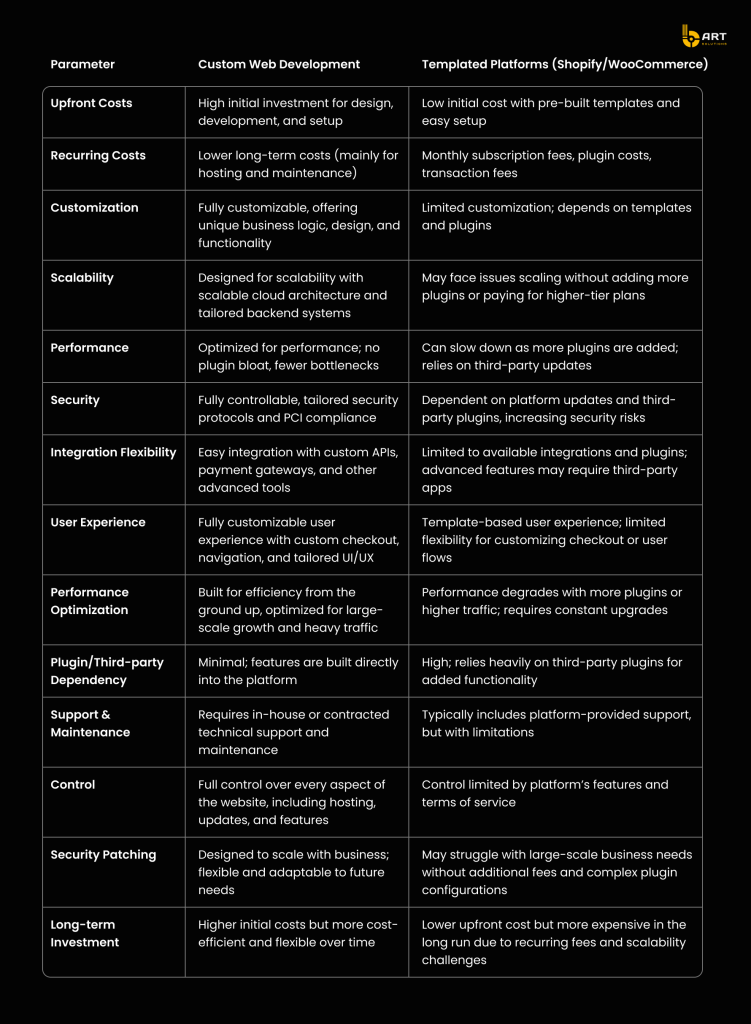
When launching an e-commerce store, businesses face a crucial decision: Should they opt for a pre-built platform like Shopify or WooCommerce, or invest in custom web development? While Shopify and WooCommerce are popular due to their ease of use and quick setup, they come with notable limitations in flexibility, scalability, and customization. A study by Econsultancy found that 44% of e-commerce businesses report platform limitations hinder their ability to scale, and 34% struggle with customization on these templated platforms.
In contrast, custom web development offers complete control over design, functionality, and infrastructure.
As personalized shopping experiences are in high demand, with 80% of consumers more likely to buy from brands offering personalized experiences, custom eCommerce platform development allows businesses to design unique features that directly impact conversions and customer loyalty.
With a scalable cloud-based platform architecture, ecommerce startups can grow seamlessly, easily handling increased traffic, expanded product lines, and complex workflows — areas where templated platforms may falter. Custom solutions also offer superior control over critical elements such as real-time inventory management, SKU management, and custom product categorization.
For ecommerce startups seeking a tailored, scalable, and high-performance solution, custom development offers unparalleled flexibility and control compared to templated platforms like Shopify and WooCommerce. In the following sections, we will explore the technical advantages and specific features that make custom web development the preferred choice for ambitious e-commerce ventures.
Now, let’s dive into the key advantages of custom web development and why partnering with bART Solutions offers a superior alternative to boxed solutions like Shopify or WooCommerce.
Customization & flexibility
One of the main reasons businesses choose custom web development is the ability to create an e-commerce platform that’s fully tailored to their needs, both in terms of functionality and design. Custom development gives you full control over your site, allowing you to design an interface that reflects your brand and aligns with the specific requirements of your customers.
With custom-built solutions, you can integrate unique features such as custom shopping cart development, a tailored checkout process, and specific payment gateway integration that matches your operational needs. Whether it’s real-time inventory management or SKU management, custom development ensures that your site evolves with your business.
By choosing custom web development and opting for cloud hosting, you also ensure that your platform is built on a flexible and scalable foundation. This enables you to handle traffic surges and integrate advanced features like custom order tracking systems or custom product categorization — tasks that can be restrictive or problematic on templated platforms.
For example, bART Solutions developed a custom platform for a fashion marketplace, delivering a fully tailored e-commerce solution that enhanced scalability and user experience. You can explore more about this success story here.
On the other hand, templated platforms like Shopify and WooCommerce rely on pre-built structures that limit your ability to customize the site to your needs. Often, you’ll need third-party plugins to extend functionality, such as adding multi-currency support or modifying the user authentication process. These plugins can create compatibility issues and introduce security risks, making your platform dependent on external developers.
Scalability & performance
In the e-commerce industry, growth can happen rapidly, and your website must be equipped to handle it. As your product offerings increase and customer traffic rises, ensuring your platform scales seamlessly while maintaining strong performance is essential.
Custom development: built for growth
A custom eCommerce platform is optimized for handling large-scale operations from the outset. By integrating scalable cloud architecture, your website can dynamically adjust to traffic spikes or an expanding product catalog. Custom-built sites can also utilize serverless architecture, which allocates resources as needed, ensuring minimal operational costs while maintaining seamless scalability.
Such an approach allows for the integration of performance-driven backend operations, like real-time inventory management integration and custom checkout development, ensuring your site remains responsive as your business grows. With custom web development frameworks, you can fine-tune your infrastructure to handle specific operational requirements, minimizing the risk of bottlenecks and downtime.
Performance limitations of template-based platforms
In contrast, platforms like Shopify and WooCommerce can struggle with performance as businesses grow. Adding multiple third-party plugins to handle complex tasks like custom order tracking or secure payment processing often leads to slower load times and reduced performance. These platforms are not inherently optimized for handling large inventories or high volumes of traffic, and their scalability is often limited by the platform’s architecture.
As a result, businesses using out-of-the-box platforms may face longer load times, checkout delays, and overall performance bottlenecks — factors that drive potential customers away.
User experience optimization
The user experience (UX) plays a pivotal role in driving engagement and conversions in e-commerce. Custom web development allows businesses to optimize every element of the user journey, providing a pleasant and intuitive shopping experience.

Custom development for tailored user journeys
Custom ecommerce websites enable businesses to design a user experience that aligns with their brand and customer preferences. You can create a highly personalized shopping experience, from the moment a customer arrives on your site to the checkout process. This includes features like a custom checkout that reduces unnecessary steps, helping to minimize cart abandonment — a problem that affects 69% of online shopping carts, according to the Baymard Institute.
Furthermore, with custom development, you can integrate advanced features such as dynamic search, personalized product recommendations, and real-time inventory updates to provide a smooth, engaging experience across devices. These tailored enhancements can significantly improve customer retention and satisfaction, encouraging repeat purchases.
Template-based solutions restrict your ability to customize the user experience
While Shopify and WooCommerce provide a structured, ready-made approach, their rigidity often becomes a challenge as businesses evolve. These platforms are designed for quick setups but can struggle when more advanced or custom features are required. Instead of offering full control, they rely on workarounds and third-party plugins to address more complex needs. As these plugins are often developed externally, they may not always function seamlessly together, leading to potential inconsistencies in performance or design.
As your store grows and you seek to implement unique features that cater to your audience, these rigid systems can begin to feel restrictive. The lack of deep customization not only limits your ability to create a fully tailored user experience but also stifles your brand’s capacity to stand out in a competitive market. Whether it’s introducing personalized shopping flows or new payment gateway integrations, the limitations of templated platforms often prevent you from evolving your website in a way that truly meets the expectations of your consumers.
Reliable security
Security is paramount in e-commerce, and businesses must ensure that customer data and transactions are protected. While both custom web development and templated platforms offer security, the level of control and customization available varies significantly.
Advanced security measures crafted to protect your business
With custom web development, businesses have full control over security measures, allowing them to implement robust solutions such as multi-factor authentication (MFA), data encryption, and custom API integrations for secure payment processing. These systems take into account your specific business needs, ensuring maximum protection against data breaches and fraud.
Custom development also enables proactive measures, such as role-based access control (RBAC) and behavioral fraud detection, to mitigate potential threats. For businesses that need to comply with specific regulations like PCI, GDPR, or CCPA, custom platforms allow for seamless integration of compliance measures, ensuring your webstore remains secure across regions.
Security bound to template limitations

While Shopify and WooCommerce offer essential security features such as SSL encryption and basic user authentication, they rely heavily on third-party plugins to expand their security capabilities. This reliance can introduce vulnerabilities, as updates and patches are controlled by third-party developers. A Sucuri report found that 56% of website hacks stem from vulnerabilities in third-party plugins — highlighting the risks associated with templated platforms.
Long-term cost efficiency
Cost is a major consideration when comparing custom web development to ready-made platforms. While custom development generally requires a higher upfront investment, it often proves more cost-efficient over time, whereas templated platforms can become expensive due to recurring fees and scalability limitations.
Custom development: higher initial cost, lower long-term spendings
Custom web development requires a larger initial investment for design, development, and infrastructure, but this upfront cost leads to long-term savings. With a custom platform, you avoid ongoing subscription fees and plugin costs typically associated with platforms like Shopify or WooCommerce. Custom development allows for seamless scalability, meaning you only pay for the infrastructure you need as your business grows.
Out-of-the-box platforms: low upfront cost, high long-term cost
While Shopify and WooCommerce may seem appealing due to their low initial costs, they operate on a subscription model, with fees that rise as your business scales. These platforms often require third-party plugins for additional features, each with its own licensing fees. As your business grows, these recurring costs, combined with potential migration expenses if you outgrow the platform, can make templated solutions more expensive in the long run.

Conclusion
In summary, while platforms like Shopify and WooCommerce may seem convenient and cost-effective at first, custom web development offers far greater long-term benefits. For businesses with growth ambitions, custom development provides the infrastructure needed to create a tailored, high-performing e-commerce platform that evolves with the business.
If you have a project in mind and are ready to elevate your e-commerce platform, contact the bART Solutions team — we’re here to help you build a solution designed for growth and long-term success.
